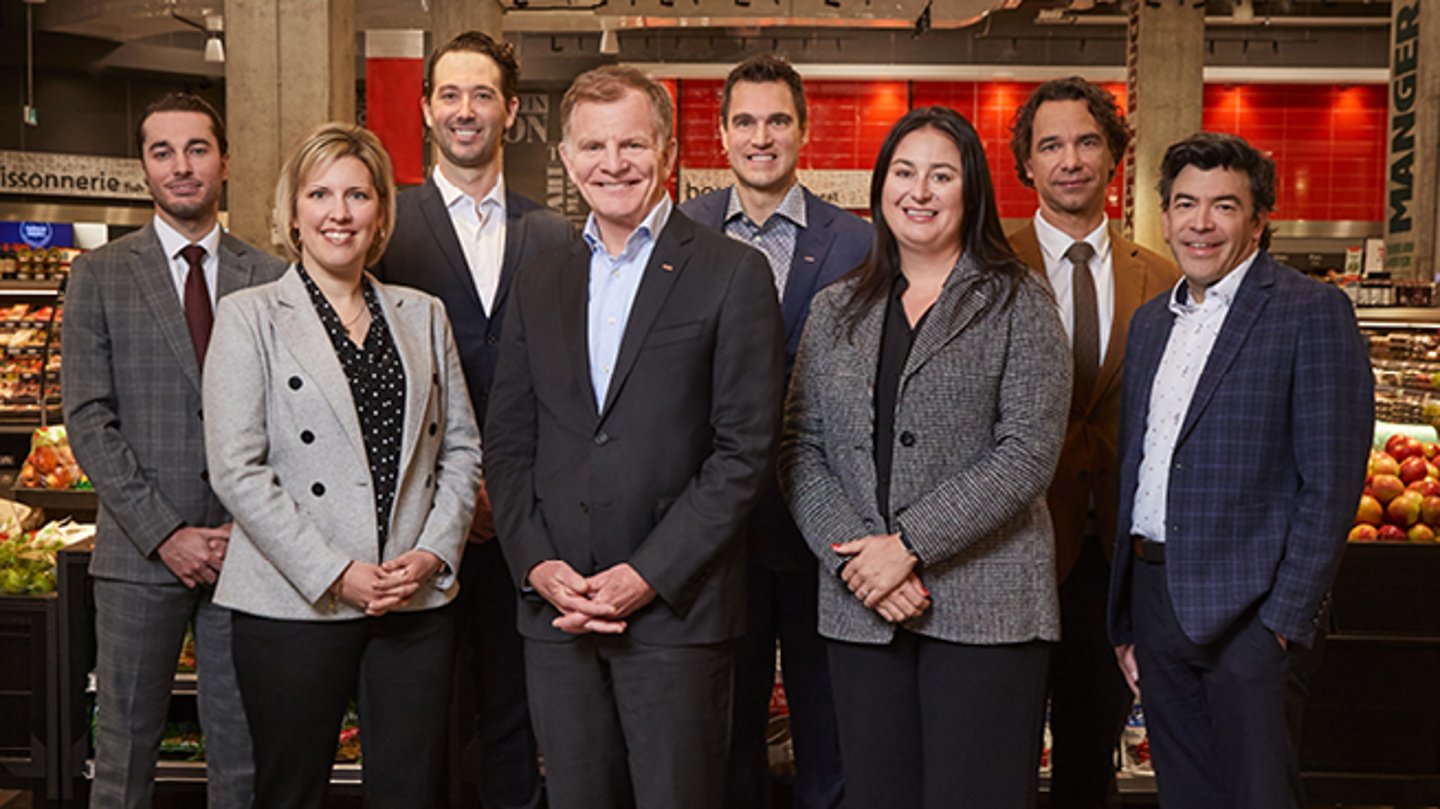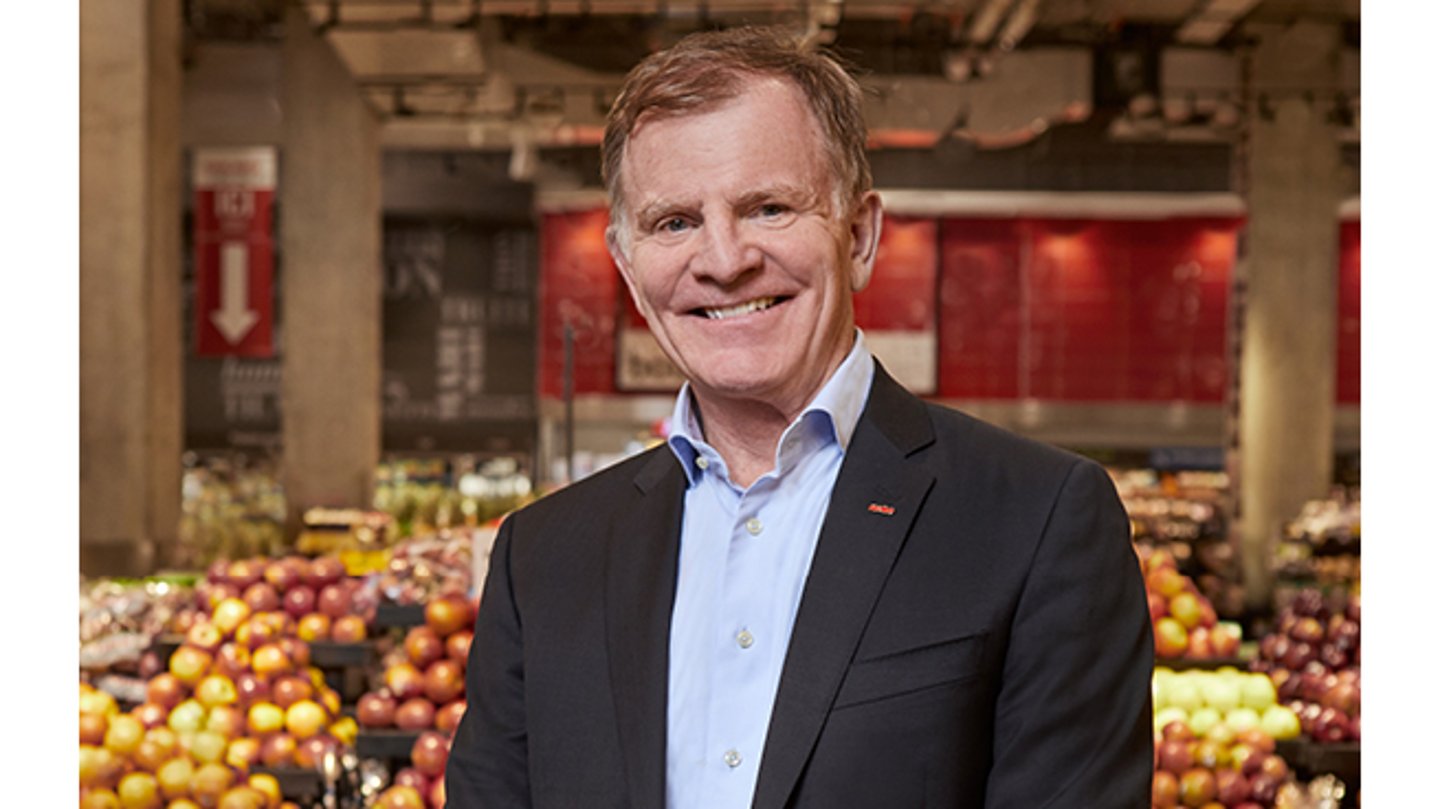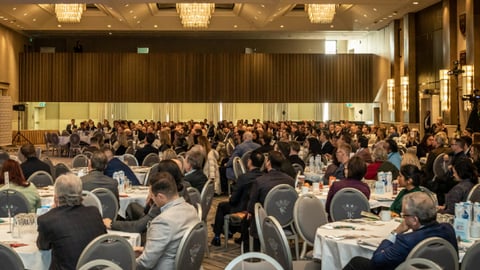As Metro marks 75 years in business, the retailer’s focus is firmly on the future
Ask Metro president and CEO Eric La Flèche what’s behind his company’s success, he’s quick to respond: “it’s not just one thing.”
Indeed, La Flèche rapidly spouts off a long list of things contributing to Metro’s steady growth. For one, a strong financial foundation, which has allowed the retailer to grow through strategic acquisitions; while a “great team” has resulted in operational excellence and strong execution; and a strategy of putting the customer “at the centre of everything we do,” has helped ensure Metro’s offer resonates with its customers in the towns and cities it operates in across Quebec and Ontario.
Under La Flèche’s watch (he’s been CEO since 2008), Montreal-based Metro has emerged as a leader not only in grocery retail (with banners that include Metro, Metro Plus, Super C, Food Basics, Adonis), but also in pharmacy where it competes in the market with Jean Coutu (the No. 1 drugstore chain in Quebec, which Metro acquired in 2018), Brunet as well as Metro and Food Basics pharmacies. All totalled, Metro generates annual sales of $18 billion across its network of some 1,600 stores.
As the retailer marks 75 years in business, Canadian Grocer spoke to La Flèche in a wide-ranging interview touching on everything from Metro’s modernization project to its progress on social responsibility and its ambitions with local and loyalty.
The interview has been edited for length and clarity. Photography by Chantale Lecours
A big priority and major investment for Metro in recent years has been its modernization project. How is this effort progressing and what benefits will it bring to the business?
It's been a strategic priority to modernize our distribution network, to improve our supply chain. Nothing to do with COVID, which stressed the supply chains all over the place. We were on this modernization plan pre-COVID. To date, we’ve built two [facilities] in Toronto. One we call “Fresh Phase One,” for produce, the other we call the “Freezer.”
The first one is semi-automated, the second is fully automated. And we’re building in Terrebonne, which is just north of Montreal, a fresh and frozen fully-automated DC [distribution centre] for Quebec. We’re also building a “Fresh Phase Two” in Toronto on the same site as Fresh Phase One. Two are done, two are coming over the next two years. They’re long-term projects with our automation partner, WITRON.
It’s a major commitment on our part in terms of capital and technology that we’re investing in this project; $800 million is what’s been announced for our DCs. It’s going to give us more capacity, it’s going to allow us to serve our stores better with fresher product, and it brings automation that will allow us to grow without adding too much labour, because in the current world where labour is such a challenge, automation helps to address those challenges.
In recent years, there’s been a lot of talk about e-commerce, but the physical stores remain important to most customers. Can you talk a little bit about Metro’s investment in its stores?
That’s something we’ve been doing consistently for as long as I’ve been with the company [La Flèche joined Metro in 1991]. It’s not a new thing. We invest to renovate and modernize our existing stores, and we invest to build new stores to grow. Hundreds of millions of dollars every year go into our store network. There are maintenance CapEx [capital expenditures], there’s renovation CapEx, expansion CapEx, and I think it’s key. It’s one of the reasons we continue to be relevant for our customers. We offer clean, modern stores [with attention] to equipment, to store layout and décor. We’ve evolved over the years and I’m very proud of where we are, and we continue to fine tune things every time we do a project, and we try to get better. New stores and renovated stores have new technology such as self-checkouts, electronic shelf labels, click and collect. It’s a key part of our success.
Turning to e-commerce – how do you keep up with rising consumer expectations in this space?
Well, from the beginning with e-comm, our approach has been flexible with multiple models. We try to meet the customer demand and be ahead of that demand, but not too far ahead of it. We all lacked the required capacity at the peak of COVID, but our e-comm sales have settled down and we are able, with our multiple models, to meet demand.
We pick [product] in our stores and deliver to customers’ homes. We offer click and collect. We have partnered with Cornershop and Instacart for customers who want more immediate delivery and we offer our own short window delivery; we have multiple models, which allows us to meet the demands of those customers who are shopping online for a portion or for all their purchases.
We see e-commerce continuing to grow, but it’s really hard to know exactly at what pace it will grow in the current short-term environment of high inflation. [High inflation] doesn’t necessarily favour e-commerce because there’s an extra cost to it – principally fees, whether it’s picking fees or delivery fees. But the customer who is more interested in convenience, we want to serve that customer in store and online. And our most loyal customers do show up both ways and they’re key customers for us that we want to keep happy. But flexibility and measured investments are key, and we think our model is working for us.
Metro has upped its game when it comes to private label and now has a robust lineup of these products, some of them award-winning. What would you say are the opportunities ahead for Metro with its private-label offer?
Yeah, Grand Prix [Canadian Grand Prix New Product] awards every year. It’s nice recognition. I'm very proud of what the team has done to innovate, to introduce new products with great packaging and that are of high quality. We’re providing really good value. More important than the awards are the sales these products are generating for us. Our private-label sales are growing at a fast pace overall. Customers are loving our products and that’s the best recognition. All the hard work has paid off. The team has updated our portfolio and our brands – Selection, Irresistibles, LifeSmart – keep evolving with new, better products to address evolving customer needs and trends. And in these high inflationary times, private label is key to providing value for our customers. I think the evolution of our portfolio is very timely and it’s serving us well. And not just in food, but in HABA [health and beauty aids] we have Personnelle, which came with the Jean Coutu deal. It’s a very strong brand and the products are doing well, not just in our Quebec stores, but in Ontario also.
You mentioned these high inflationary times – how are you navigating this challenge?
Inflation is a big issue these days, for sure. It’s gone up quickly the last several months, which is not good for anybody. It’s not good for Canadians, it’s not good for families, it’s not good for our employees. But it’s an industry/global issue where the cost of goods has risen. Our vendors, suppliers, everybody is facing cost pressures, and we have been facing severe cost increases for several months now. Just over the past year [we’ve seen] thousands and thousands of cost increases on, I’ll say over 25,000 products, not just once a year but multiple times. And increases have been unprecedented in terms of size. Not just the number of increases, but the size of the increases has been unprecedented, which has caused this significant inflation. Clearly, it’s something that we’re concerned about, and our teams are working really hard in all our banners to provide our customers the best value possible in this tough environment.
Another area Metro has placed much focus, in both Ontario and Quebec, is in promoting locally-made products – what’s behind the local strategy?
Well, our purpose is to nourish the health and well-being of our communities. Local businesses are part of our communities. We’re here for our customers first, and giving back to our communities is not just charity, it’s promoting local companies, local suppliers. So, if we’re going to be the best community supermarket or the best community pharmacy, I think a good part of that is to have a local essence or flavour to it, and that’s what we try to do.
In Quebec, the program is called Essor Québec, and with a supplier association we’re developing a training guide for small and medium-sized businesses to make their products more visible and accessible to our customers. We’re making it easier for small companies to offer their products in our stores – they have a single point of contact for innovation at Metro, so these small suppliers don’t get the runaround. Sometimes with the large chains, the listing decisions take time, but for local products we try to make it easier. And, so far, we have been successful with that. In Ontario, the program’s called Locally Sourced. The Metro and Food Basics banners do a great job in Ontario; there’s a little more marketing at Metro in Ontario with local. The sponsorship of the Royal Agricultural Winter Fair in Toronto is a good example where we showcase some of the best producers and suppliers in Ontario. And it has provided them good access to our shelves.
Earlier you mentioned that nourishing the health and well-being of your communities is the company’s purpose. Talking about health, how is Metro well positioned to deliver on the health needs of consumers?
Metro as a company, especially in Quebec, is well positioned because we own Jean Coutu, the No. 1 pharmacy chain in Quebec, and if we add Brunet to that we are the leading pharmacy retail provider. Pharmacy’s role is primarily a health role. It’s an essential part of delivering prescriptions in Quebec, providing health services [and so on].
On the food side, health is nothing new. It has been a consumer trend for a while. We talked about our private label, but also in the rest of our offer, in our promotional programs or in the meals we prepare in our stores, we try to have a healthier offering. And every year, we’re providing healthier products in our stores. We have a program called My Health My Choices, which is a digital tool that helps customers find products that are suited to their lifestyles, their values and their health needs. Products are classified along attributes like organic, gluten free, vegetarian, no sugar added. That really helps customers to pick up the right products according to their choices and their health, like the program’s name suggests. It’s just one way to make it easier for our customers to manage their health with what they eat. And like I said, the development of better-for-you products has been a large driver of our growth in private label. And we’re committed to increasing our healthy products offering in private label by 10% per year for the next five years. It’s part of our corporate responsibility commitment.
On the subject of corporate social responsibility, we hear again and again that consumers want to support companies that are doing the right things. Can you talk about some of Metro’s key initiatives in this area?
What I’m most proud of is that our work [in this area] didn’t start yesterday; it started more than a decade ago and we’ve been publishing reports for the past 11 years on our corporate responsibility journey. Last January, we issued our plan for 2022 to 2026 with a lot of updated targets on the environment, on waste, on procurement, on diversity. I think we have a rigorous program that we’ve been working at for quite a while, and we will continue to do so in the future.
There’s a lot of focus on the environment for sure. Single-use plastic bags, we’ve reduced them over the years, but now we’re committed to eliminating them. By the end of this year, we will get there. I’m proud of that. With our Sustainable Fisheries and Aquaculture Policy we’ve done a lot of good work to have responsible procurement and to buy from the right suppliers and to buy the right product. The fish you’re not supposed to sell, we don’t sell.
And recently, we became a supporter of TCFD, the Task Force on Climate-related Financial Disclosures. We’re the first food and pharma retailer to do this; we believe it’s the right thing to do. It’s a reporting standard on your resilience to climate change and the risks associated with climate change; this will increase transparency on climate-related risks and opportunities. We’re proud to have signed on as a supporter of TCFD. Along with that, we have made commitments or set new greenhouse gas (GHG) emission reduction targets. We issued that last January. [Our objective] is to reduce GHG emissions by 37.5% before 2035 [compared to 2020]. This is not net zero, but we have committed to continue to assess the feasibility and the costs to achieve net zero to meet the SBTi [Science Based Targets Initiative]. We’re not there yet, but we’re really committed to assessing it and costing it. Before we commit, we need to see the path and make sure that the financial costs can be absorbed. Because we’re not just going to promise and not deliver.
In Metro’s 2021 Annual Report, continuing to develop loyalty programs was identified as a priority, and recently the company announced a revamp of the metro&moi rewards program, now called Moi. What do you hope to achieve with this new program?
Yeah, it was big news for us when we announced that [in September], and it’s a big priority for this next fiscal year to launch the new program, Moi. It’s the evolution of metro&moi, which we introduced in Quebec in 2010. We’re basically relaunching it in 2023 to call it just Moi because it’s going to be available in most of our Quebec banners, both food and pharma, so at Metro, Super C, Jean Coutu, and it should be at Brunet, but we haven’t confirmed that yet. With Moi, people will have more locations [about 700 across the province] and more brands with which to accumulate and redeem points. We think it’s a better, stronger program for our customers with more choice and more ability to collect points.
Plus, we’re going to have a partnership with Royal Bank of Canada for a co-branded credit card. It’s going to be the Moi RBC Visa, and every dollar spent on that card will also allow customers to accumulate points that can be redeemed in our stores. We have a lot of traffic in our stores; 95% of the population of Quebec comes to one of our stores at some point during the year so we think we have the potential to make the best loyalty program in Quebec with Moi. We plan to launch it in the spring.
When it comes to talent, what has the company been doing to “develop the best team”?
We can’t do what we aim to do or what we strive to do if we don’t have a great team. Being an employer of choice is essential, so we need to offer competitive pay and be a great place to work and that starts with having a good culture and having people with common values, and then you have a shot at being an employer of choice. Again, easier said than done; it’s something that is built over time, but I think we do have a strong culture at Metro. We have a very good team and I do think we have a great place to work. We train, we provide leadership opportunities and it’s not just an HR project, it’s a company project. Everyone is in charge of culture and attracting the best people to have the best team. It’s a company value to develop that, and it’s a value we cherish.
A code of conduct for the industry is in the works and could soon become a reality. What do you hope the code will achieve?
We need to finalize it and rebuild consumer confidence in our industry.
As you look ahead, what are the company’s key priorities next year and beyond?
Well, we have to navigate through this turbulence of high inflation. That’s certainly a short-term priority. And providing the best value possible – that’s No.1. We want to continue to grow as a company; we have been growing steadily for a long period of time, so we want to continue on that path. It’s busy times.
Anything else?
Over its 75 years, even though Metro has grown through many acquisitions, be it Super C, Steinberg, Loeb, A&P, Adonis, Première Moisson, Jean Coutu – they all came at different stages of the company, and what I’m really proud of is that we've been able to form one company, one team, with all these acquisitions. It takes a bit of time – with cultural integration and systems integrations, but we have been successful in growing the company and becoming one strong company, one group, one team that provides value to our customers to serve our purpose.
This article was first featured in Canadian Grocer’s December/January issue.





